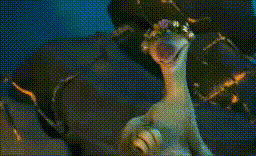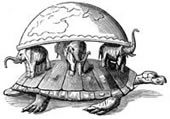THE TRADITIONAL RUTS OF PLEASURE AND SECURITY
This essay is about focusing. It's about how focusing, if it's in some way pleasurable, always leads to repetition; it always leads to wanting more.
Other animals repeat their instinctive behaviour; but humans focus on and repeat learnt behaviour, we focus on and repeat all the things we want for pleasure and security.
And as the repetitions combine, and the combinations repeat, gradually everything goes quicker and gets more complex.
The Anthropological Timeline gives a scientific, objectively researched timeline of the ever-increasing pace of life – the velocity of change and development throughout our earth's history – and then there was man...
The Human Survival Strategy
Humans secured their survival with their focusing abilities. Unlike all other animals, we learnt how to survive without actively using our panorama senses.And how we focused, developed amazingly and relentlessly. We could focus on memories, repeat selected ideas, associate them and learn. Focusing gave our imagination the practical context of words and concepts, and it got things done.
 Humans processed, collected and communicated ideas quickly. And from hammering the first flint tools, to making fire, to constructing wheels, it was a remarkable story, clever and creative, and life slowly became more enjoyable.
Humans processed, collected and communicated ideas quickly. And from hammering the first flint tools, to making fire, to constructing wheels, it was a remarkable story, clever and creative, and life slowly became more enjoyable.
Focusing led to a world which gave us new and exciting choices, it even allowed us to develop a sense of purpose in life – to have focal points in life.
We focused on and repeated everything which gave us security or pleasure, and civilisation slowly developed comfortable cultural habitual ruts... with an ever-increasing multiplicity of things to want.
The Speed of Modern Life
In the material world The Speed of Life increased with a simple dynamic.It's hard to put exact dates on it as different civilisations rose and fell, but generally, the increased choice had a beneficial effect and made life easier and more comfortable. And the progress which modern living offers is socially accepted, and welcomed by a vast majority, who only complain about the shadow side – the inevitable exponential increase in costs.
However, added to the inflation, now, for the first time in history, there is a population explosion. And the sheer quantity of material products for the masses, the exploitation, waste, pollution, and inevitable population migrations, are causing chaotic global problems.
This critical situation is crystal clear to anyone with a brain, and many people have already described it in great detail.
However, we never recognise that all this is a product of focusing, because that's just the way we always do things – we have no awareness that there is any other way of sensing and being in the world.
The Psychological Evolution of Man
All the physical and material aspects of life follow a simple line of repetition, they have a simple growth dynamic.
On a psychological level, the repetitions have a far more profound and complex dynamic.
Beliefs and Their Confirmation
When early humans developed beliefs, they gave meaning to our lives and became the central priority for our sense of reality, identity, purpose, and even security, hope and satisfaction. They became our central focal points. As with most other animals, our survival depended on a sense of belonging to a group. And for us humans, this meant the mutual affirmation of the ideas and beliefs of our tribe.
As with most other animals, our survival depended on a sense of belonging to a group. And for us humans, this meant the mutual affirmation of the ideas and beliefs of our tribe.
And it really didn't matter much if we all believed we were living on the back of the Great Turtle,  or, that the stars were the children of the sun and the moon – because for our sense of identity and security, the confirmation of the tribe was more important than the truth.
or, that the stars were the children of the sun and the moon – because for our sense of identity and security, the confirmation of the tribe was more important than the truth.
Our culture's abstract beliefs were central to our identity, security, and understanding of life. And generations of children were reassured as we repeated our stories, and established our culture's identity.
So in a similar way to the material speed of life, throughout the early development, the repetitions had a stabilising, unifying effect, and encouraged psychological security within a tribe or nation.
Even over the last few thousand years as wars became common; the psychology of the individual was stable and secure, and the separate cultures each had their integrity.
Beliefs and Their Confirmation explores how our understanding of the spiritual world developed, and then overloaded...
From Insecurity to Overfocusing
Over the last few centuries, as modern man developed his abilities with abstract thought, we started questioning our beliefs.This was the beginning of a new era, and as the questioning repeated and accelerated, we lost the mutual confirmation of our social group.
 We humans are often in denial about our psychological insecurity. But we face a form of collective psychological insecurity, which no previous culture has ever experienced.
We humans are often in denial about our psychological insecurity. But we face a form of collective psychological insecurity, which no previous culture has ever experienced.
Our modern liberal social thinking to integrate the diversity of beliefs is a great step for civilisation. But, it can never replace the security of the mutual, united and unquestioned confirmation of all the members of an entire local social group.
In modern times abstract beliefs lead socially to division, and individually to insecurity and worry.
The endless discussions going round and round inside our own heads are self-evident. With each individual trying to confirm their own beliefs and opinions, by their constant repetition.
This is a recent, extremely uncomfortable, cultural habitual rut.
Some people cope admirably, but all the time, we are coping with a situation which no other animal or early human has ever experienced or even imagined.
Regardless our modern material security, we are collectively psychologically insecure.
And we compensate for this insecurity with our species' tried and tested survival strategy – searching for answers, with even more focusing.
We are overfocusing. We have collectively developed what in animal psychology would be seen as a form of displacement behaviour.
Please continue with Displacement Behaviour in Humans
Back to Chapter Three : Civilisation's Habitual Ruts
Back to THE PANORAMA SENSES Priority Pages